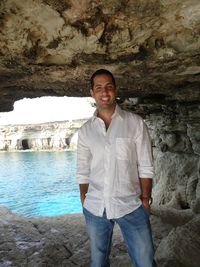Andreas P. Andreou: Difference between revisions
No edit summary |
No edit summary |
||
| Line 9: | Line 9: | ||
Mr. Andreas Andreou joined [[Future Worlds Center]] as an intern in February 2015. | Mr. Andreas Andreou joined [[Future Worlds Center]] as an intern in February 2015. | ||
==Short Bio== | |||
Mr. Andreas Andreou holds a BA in Greek Philology, pathways Linguistics (Excellent) from the University of Patras (Greece) and an MSc in Forensic Linguistics from Aston University, UK. Being particularly interested in the use of language in the crime, his MSc thesis focused on the analysis of text messages written in Greeklish, namely, the representation of the Greek language with the Latin alphabet, aiming at examining whether we can identify the author of an unknown Greeklish text message by merely examining its language. Having identified the key role that language plays in the cyber crime, his research interests mainly lie in the field of forensic authorship analysis aiming at (a) raising awareness for the dangers that children face on the Internet and (b) analyzing criminal evidence from a linguistic perspective. | |||
Revision as of 05:52, 7 February 2015
Mr. Andreas Andreou joined Future Worlds Center as an intern in February 2015.
Short Bio
Mr. Andreas Andreou holds a BA in Greek Philology, pathways Linguistics (Excellent) from the University of Patras (Greece) and an MSc in Forensic Linguistics from Aston University, UK. Being particularly interested in the use of language in the crime, his MSc thesis focused on the analysis of text messages written in Greeklish, namely, the representation of the Greek language with the Latin alphabet, aiming at examining whether we can identify the author of an unknown Greeklish text message by merely examining its language. Having identified the key role that language plays in the cyber crime, his research interests mainly lie in the field of forensic authorship analysis aiming at (a) raising awareness for the dangers that children face on the Internet and (b) analyzing criminal evidence from a linguistic perspective.
